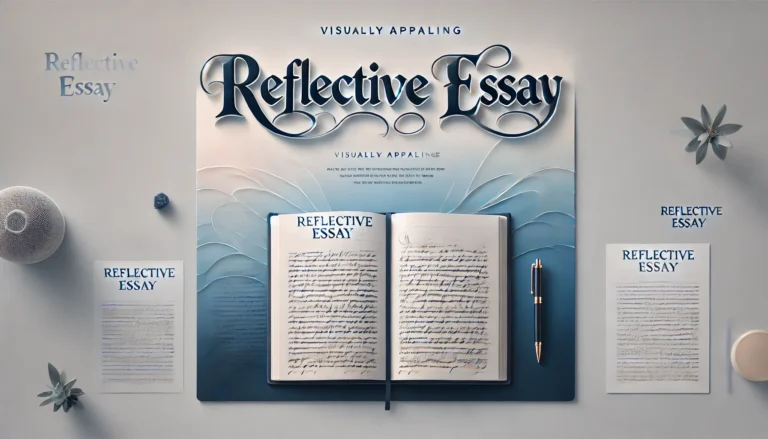Essay Writing Guides
A Complete Guide on How to Write a Reflective Essay


Reflective essays offer a unique opportunity to connect personal experiences with universal truths, allowing writers to explore and articulate their inner thoughts and feelings. By examining their responses to events, actions, or conditions, writers gain insights that can lead to personal growth and greater self-awareness. This article will serve as a comprehensive guide to crafting effective reflective essays, from understanding their purpose to mastering the format and structure required to express oneself authentically.
Embarking on the journey of writing a reflective essay can be as enriching as it is educational. These essays are more than just academic assignments; they are a window into the writer’s soul, providing a platform to analyze and evaluate personal experiences while relating them to broader life lessons. This guide will walk you through everything from the basics of defining a reflective essay to the detailed steps of writing one, ensuring you have all the tools necessary to create a powerful and reflective piece.
What is A Reflective Essay
A reflective essay is a type of writing that requires the author to analyze their personal experiences and explore how these experiences have influenced their thoughts, feelings, or behavior. It’s introspective, encouraging writers to delve deep into their past and examine the impact of specific events on their present selves. Unlike typical academic essays, a reflective essay focuses less on providing factual information and more on expressing subjective insights and reflections. This writing genre helps individuals clarify their life choices and understand their personal growth and learning processes.

Get Help with Your Reflective Essay?
Competent writers are online and ready to step in.
Types of Reflective Essays
Reflective essays vary significantly depending on their purpose, context, and audience. Below are a few common types:
- Educational Reflective Essay: Often assigned in academic settings, this type focuses on the writer’s learning experiences. Students may reflect on a particular lecture, a learning experience, or their progress in a course, discussing what they learned and how they plan to apply that knowledge in the future.
- Professional Reflective Essay: Used in professional fields such as nursing, teaching, or business, these essays analyze professional behaviors and experiences. They often serve as a tool for professionals to evaluate their actions in a particular situation and consider improvements or growth.
- Personal Reflective Essay: This type explores personal experiences and emotions. It is more narrative, allowing the writer to delve into their personal life and discuss significant events that shaped their personality or life decisions.
- Group Work Reflective Essay: Individuals reflect on their contributions to group activities in a group setting. This type of essay assesses teamwork skills, communication dynamics within the group, and the overall experience of working collaboratively.
Each type encourages a deep exploration of personal experiences and learning, tailored to the specific environment in which it is used.
Reflective Essay vs. Narrative Essay
Reflective essays and narrative essays share the common ground of delving into personal experiences. Both require the writer to explore and articulate thoughts and events from their lives. However, the core distinction lies in their focus: while narrative essays are centered on recounting events, almost like a story with characters, setting, and a plot, reflective essays delve deeper into the personal transformations and insights that emerge from those events. Essentially, a narrative essay tells a story, whereas a reflective essay examines the implications and personal growth that result from the story’s events.
Pre-Writing Tips: How to Start Writing the Reflection Essay?
Starting to write a reflective essay can feel daunting as it’s not just about storytelling but also about deep personal introspection. Select a topic that resonates deeply to embark on this reflective journey. This topic should be more than just an event—it should be an experience that has significantly shaped your perspective or behavior. Think about moments in your life that sparked a change, challenged your beliefs, or prompted a shift in your understanding. These can range from pivotal decisions encounters with influential individuals to profound books or films that stirred your thoughts.
When choosing your topic, consider the emotional and intellectual impact of your experiences. Reflective essays thrive on the writer’s ability to connect their personal growth to broader themes. Ask yourself: How did this experience change me? What lessons did I learn? How did my views or behaviors evolve as a result? Structuring your essay around these questions can provide a compelling narrative that recounts an experience and explores its profound impact on your life. Whether it’s a lesson learned from a failure, the joy of unexpected success, or a quiet reflection on a personal milestone, your essay should provide insights that invite the reader to consider their reflections alongside yours.
Reflective Essay Format
The format of a reflective essay is crucial for guiding the reader through the writer’s personal journey and reflections. Typically, a reflective essay should be organized as follows:
- Introduction: Begin with an engaging hook that grabs the reader’s attention, followed by a brief explanation of the essay’s purpose. The introduction should set the scene for the reflection and include a thesis statement that briefly states the main impact or change that resulted from the experience.
- Body: The essay’s body is where the bulk of reflection occurs. It should be organized into paragraphs, each focusing on a specific part of the experience or a particular aspect of its impact on you. Start each paragraph with a clear topic sentence that introduces the paragraph’s focus. Use descriptive writing to convey your feelings and thoughts, and include specific examples and anecdotes to illustrate your points. You can also explore your feelings, reactions, and insights in depth.
- Conclusion: The conclusion should summarize the essay by summarizing the main insights or changes discussed in the body paragraphs. Reflect on the broader implications of your reflections—how have they shaped who you are today? Consider also suggesting how these insights might influence your future actions, decisions, or beliefs. A strong conclusion will give readers something to ponder about their life experiences and reflections.
This structure helps maintain clarity and focus throughout the essay, guiding the reader through your reflective process in a coherent and impactful way.
5 Steps to Writing Your Reflective Essay
Writing a reflective essay involves introspection and analysis. The section below outlines five essential steps to guide you through the writing process:
- Select Your Topic: Begin by choosing an experience that profoundly impacted you. This could be a personal triumph, a challenging setback, or a transformative moment. The experience should be significant enough to provide rich material for reflection and involve some development or change in your perspective or behavior.
- Reflect Thoroughly on the Experience: Before you start writing, spend some time thinking deeply about the event. Consider how it affected you at the time and how it continues to influence you. Try journaling your thoughts and emotions to capture the nuances of your reflections. Ask yourself what you learned, how you grew, and why the experience was impactful.
- Outline Your Essay: Organize your thoughts and structure your essay. An outline can help you arrange your points logically and ensure that each section flows into the next. Typically, an outline includes an introduction that sets up the story, several body paragraphs that delve into different aspects of your reflection, and a conclusion that ties everything together.
- Write the Draft: Start with the introduction, where you briefly set the scene of your story, leading to a clear thesis statement that outlines what the essay will discuss. Use specific details and anecdotes to illustrate your reflections in the body paragraphs. Each paragraph should focus on a single idea or theme. In the conclusion, summarize the insights gained and reflect on the broader implications of your experience.
- Revise and Refine: After writing your initial draft, take time away from the essay before reviewing it. On your return, read your essay with fresh eyes to identify any inconsistencies, repetitive points, or unclear sections. Consider whether your reflections are conveyed effectively and whether the essay captures the emotional and intellectual impact of the experience. Finally, proofread for grammar, spelling, and punctuation errors.
Reflective Essay Outline
Creating a structured outline is a crucial step in writing a reflective essay. It ensures your thoughts are organized and presented clearly. Here’s a detailed outline that can guide you through writing your reflective essay:
Introduction
- Hook: Start with a compelling statement or question to grab the reader’s attention.
- Context: Briefly introduce the experience you will be reflecting on. This could be a specific event, situation, or period in your life.
- Thesis Statement: End the introduction with a clear thesis that hints at the overall impact of the experience on your life or the lessons learned.
Body Paragraphs
- Paragraph 1: Description of the Experience
- Introduce the setting and the people involved.
- Describe the event or experience in detail, ensuring to focus on your personal involvement.
- Paragraph 2: Analysis and Reflection
- Analyze the significance of the experience. Discuss your thoughts and feelings at the moment.
- Reflect on why the experience was important and how it affected you personally.
- Paragraph 3: Lessons Learned and Personal Growth
- Discuss the lessons learned from the experience. How did the experience change your perspective?
- Describe any skills developed or personal growth that occurred as a result of the experience.
- Additional Paragraphs (if necessary):
- Continue to explore other dimensions of the experience, such as its impact on your future decisions, relationships, or career.
- Each paragraph should focus on a different aspect or angle of reflection related to the experience.
Conclusion
- Summary of Insights: Recap the main insights or transformations that resulted from the experience.
- Future Implications: Discuss how the lessons learned will influence your future actions or decisions.
- Closing Thought: End with a final thought or question that leaves the reader pondering their experiences and reflections.
This outline provides a clear framework for your reflective essay, allowing you to explore deeply your experiences while maintaining a coherent and structured narrative.
Reflective Essay Examples
Final Remarks
In summary, writing a reflective essay involves more than just recounting an event; it requires introspection and critical thinking to analyze how specific experiences have shaped your thoughts and actions. From understanding what a reflective essay is and the various types you might encounter to differentiating it from a narrative essay and learning the pre-writing tips and format, this guide provides a comprehensive roadmap. Following the outlined steps and using the provided examples, you can craft a reflective essay that recounts your experiences and offers deep insights into your personal growth and development.
If you still find writing a reflective essay challenging or confusing, don’t worry—help is available. Masters Writers offers professional essay writing services to assist you in writing well-structured and insightful reflective essays. Whether you need help brainstorming topics, organizing your thoughts, or polishing your final draft, their experienced writers can support you. Reach out to Masters Writers to ensure your reflective essay effectively captures your experiences and insights, making your writing process smoother and more successful.

Essay Workload Is Getting Tougher?
Opt for academic relief with our professional service.
FAQs
How do you write a reflective essay?
To write a reflective essay, choose a personal experience or event to focus on. Then, deeply reflect on how this experience impacted you or changed your perspective. Organize your thoughts into an outline, and write an introduction that hooks the reader and introduces the reflective topic. In the body paragraphs, describe the event, analyze your reactions, and discuss any lessons learned or insights gained. Summarize your reflection and consider its broader implications on your personal development or future decisions.
What is the main point of a reflective essay?
The main point of a reflective essay is to articulate and explore how specific experiences have contributed to personal growth or understanding. The goal is to provide a thoughtful, personal account of changes in perspective or insights gained from experiences rather than simply describing events. It deepens self-awareness and encourages critical thinking about one’s actions and results.
What are the three parts of a reflective essay?
The three primary parts of a reflective essay are:
- Introduction: This part should grab the reader’s attention and introduce the experience that will be reflected upon. It often includes a thesis statement that sets up the focus of the reflection.
- Body: The body paragraphs explore the details of the experience and delve into personal reflections on how the experience affected the writer. Each paragraph should focus on a different aspect or moment of the experience, discussing feelings, responses, and personal insights.
- Conclusion: The conclusion wraps up the essay by summarizing the reflections and insights discussed. It should also reflect on the overall impact of the experience on the writer’s life and possibly look forward to future implications or lessons learned.
What is a good opening sentence for a reflective essay?
A good opening sentence for a reflective essay should immediately capture the reader’s interest and set the tone for the reflective nature of the essay. It could be a provocative question, a striking quote, a vivid description of a scene, or a personal revelation. For example: “Looking back, I realize that the summer I spent in Madrid changed my view on cultural diversity and taught me that true learning comes from stepping out of your comfort zone.”

